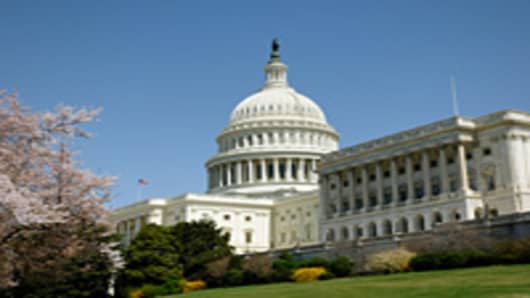The Republican plan to slash government spending by $61bn in 2011 could reduce US economic growth by 1.5 to 2 percentage points in the second and third quarters of the year, a Goldman Sachs economist has warned.
The note from Alec Phillips, a forecaster based in Washington, was seized in the ongoing US budget fight by Democrats as validating their argument that the legislation approved by the Republican-led House of Representatives last Saturday would do significant damage to the US recovery.
Chuck Schumer, the Democratic senator from New York, said: “This nonpartisan study proves that the House Republicans’ proposal is a recipe for a double-dip recession. Just as the economy is beginning to pick up a little steam, the Republican budget would snuff out any chance of recovery. This analysis puts a dagger through the heart of their ‘cut-and-grow’ fantasy”.
The Goldman analysis also points out that a potential compromise deal with $25bn in spending reductions this year – a more likely scenario – would lead to a smaller drag on growth of 1 percentage point in the second quarter.
Thereafter it would fade, with “negligible” impact on US output by the end of the year. This could make it harder for Democrats to argue that a more modest dose of spending reductions will have a meaningfully adverse economic impact.
Goldman, which is currently forecasting US gross domestic product growth of 4 per cent in the second and third quarters of 2011, also pegged the cost of a government shutdown to the US economy at $8bn in reduced spending per week, based on the experience of the federal closures of 1995 and 1996.
A government shutdown in the world’s largest economy will occur if Congress and the White House do not agree on a budget measure by the end of next week. Tough rhetoric from Republicans and Democrats has engulfed Washington in recent days, as both sides are positioning themselves for the final round of negotiations and trying to avoid blame if a shutdown occurs.
With Congress in recess, the ideological and political battle over US budget cuts is playing out in state capitals across America, in cities like Indianapolis, Columbus, and Madison.
Democratic state senators in Wisconsin on Wednesday remained in a tense standoff with Republican governor Scott Walker over a proposed budget bill that would severely curtail union rights to collective bargaining. Democratic lawmakers defended their decision to flee the state last week to prevent the proposal from passing, arguing that failure to defeat Mr Walker’s measure would be a devastating blow to unions across the country.
“We are in the battle of our lives against a really right wing agenda. If we can’t do it at this point, we will fundamentally change the character of our country and our state for a generation” said Mark Miller, the top Democratic state senator.
While Republican governors like Mr Walker and New Jersey’s Chris Christie, who is pushing similar changes to union rules, have become heroes to activist conservatives and Tea Party members who believe fundamental changes to state budgets can only be accomplished with sweeping labour reform, public opinion polls show the strategy carries risk.
A Gallup poll released this week showed that 61 per cent of Americans opposed the kind of legislation that was proposed by Mr Walker in Wisconsin and a slim majority (53 per cent) oppose reducing pay and benefits for state workers.
The polling shows that Republicans risk overreaching. At least two Republican governors, Mitch Daniels of Indiana and Rick Scott of Florida, seem to have taken that message on board, and are distancing themselves from efforts to rein in labour unions.
Mr Daniels this week said he disagreed with efforts by Republican colleagues in his state to pass an anti-union measure, and refused to deploy state police to track down Democratic lawmakers who had abandoned the capital to avoid a vote on the measure.


